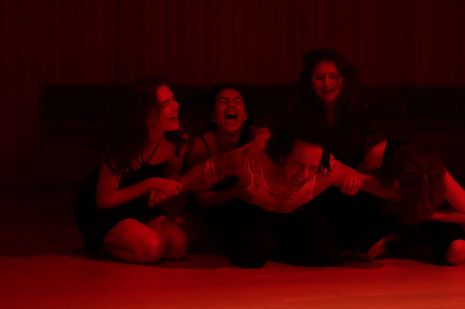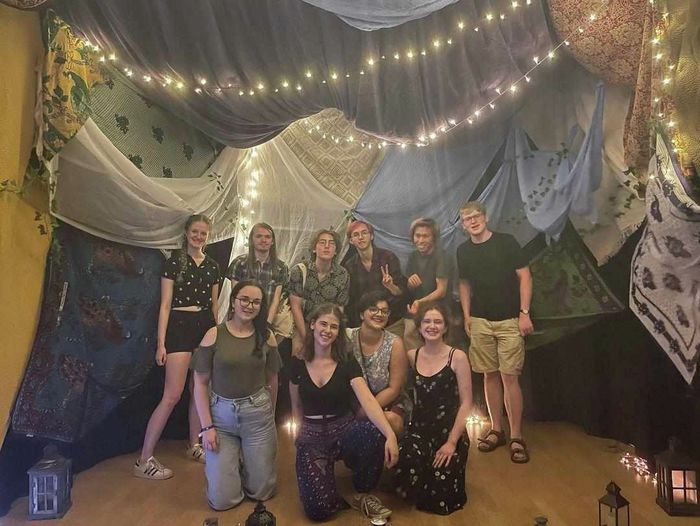The Bacchae ‘entices you with the promise of yes’
An engaging exploration of mania and tragedy let down by poor staging

Immersed in its blend of the traverse stage, accents from the American South, and challenging blocking, this adaptation of Euripides’ work presented an intriguing premise. However, the execution left something to be desired. The unconventional staging with the characters frequently facing away from the audience, created a disconnect that hindered the accessibility of the iconic writing.
“The play was at its best when the titular Bacchae swirled enchantingly around the stage”
To begin with, The Bacchae entices you with the promise of “yes” and the associated freedom that comes with it, but the tragedy of the play breaks through as we learn that the worship of Dionysos, and all it encompasses, can be more of a curse than a blessing; that its freedom comes from a submission to something higher. The play was at its best when the titular Bacchae — the cult of Dionysos — swirled enchantingly around the stage, aided by floods of deep red and orange, chanting “yes, yes, yes”. Embracing the chaos of the bacchanal (The Secret History fans, this is the play for you) allowed for this production to break free of the shackles of the limiting stage as the hysteria and furore filled the theatre.
Unfortunately, Agave (Alice Weatherly) conveyed the tragedy that emerged as a result of the surrender to Dionysos - the murdering of her own son - poorly. Learning what she had done whilst in the Dionyson-enduced trance, Agave seemed to be only rather mildly inconvenienced, as one might be if they found out a lecture had been cancelled after walking all the way to Sidgwick, rather then, well, horrified at seeing that she had murdered her son, her own flesh and blood, the Prince of Thebes: Pentheus (Rob Monteiro).
“The play’s setting added an intriguing layer of depth”
Monteiro’s was the stand-out performance in this otherwise fine production. Laughs came at all the right times as a result of his excellent comic timing and full-bodied performance. But he was much more than just comic relief: he played an insecure, naive, young ruler ready to stamp his mark of authority on Thebes. As a result of the choice to stage the David Grieg adaptation, which infuses the classic play with links to the American South, Pentheus’ fear of the other, as characterised by Dionysos and his cult, resonated powerfully for the 21st-century viewer. This resonance became strikingly evident as we witnessed Pentheus’ desire to control, his ignorance concerning those he did not understand, and the way in which that ignorance manifested into a toxic blend of fear and hatred. The play’s setting added an intriguing layer of depth to these resonances as it drew parallels between the region’s own historical struggles with issues of control, ignorance, and the fear that stems from unfamiliarity. The real-life echoes of deep-seated divisions, racial tension and the clash of traditional values with emerging cultural movements were never far from my mind.
Charlie Scott-Haynes, who played Dionysos (catalyst for the conflict), perfected the slow southern drawl that oozed confidence and control but at times failed to seem divine, the very thing that Dionysos is intent on convincing Thebes he is. Rather than giving a bold, enigmatic vision of divinity, I felt that Dionysos was played rather safely, falling into well-trodden tropes of arrogance and cockiness. Of course there is a reason why these tropes are familiar, because to some degree they work and differentiate Dionysos’ assured confidence in his own authority and power with Pentheus’ scramble to project such authority and power. However, I feel as though there was a missed opportunity to stretch the boundaries and conceptions of divinity, and the way it is performed . That being said, Scott-Haynes did excel at directing the action and setting the tempo of the production.
Overall the production was decent. It has good moments but it seems to lose its way when either Monteiro or Scott-Haynes weren’t on stage to centre it. More attention to blocking to offset the difficulties imposed onto the production by the venue could have really enhanced it, as it would have allowed the audience to actually see more of the cast, and the team’s hard work.
The Bacchae played at Frankopan Hall in Jesus College from Friday 16th to Saturday 17th June, 2023
 News / University Council rescinds University Centre membership20 February 2026
News / University Council rescinds University Centre membership20 February 2026 News / Hundreds of Cambridge academics demand vote on fate of vet course20 February 2026
News / Hundreds of Cambridge academics demand vote on fate of vet course20 February 2026 News / Judge Business School advisor resigns over Epstein and Andrew links18 February 2026
News / Judge Business School advisor resigns over Epstein and Andrew links18 February 2026 News / Union cancels event with Sri Lankan politician after Tamil societies express ‘profound outrage’20 February 2026
News / Union cancels event with Sri Lankan politician after Tamil societies express ‘profound outrage’20 February 2026 News / Caius students fail to pass Pride flag proposal20 February 2026
News / Caius students fail to pass Pride flag proposal20 February 2026










